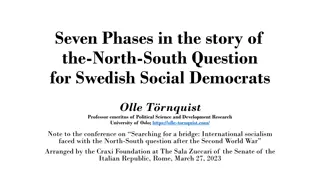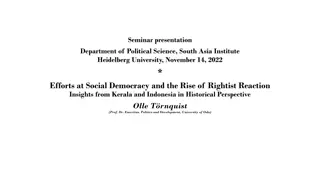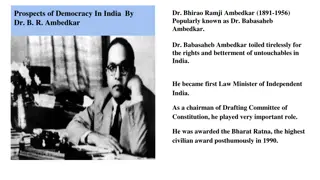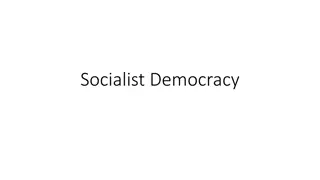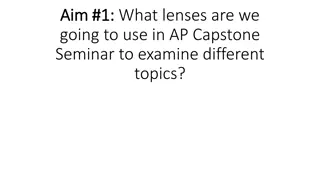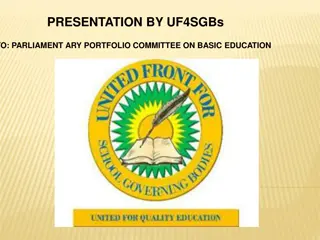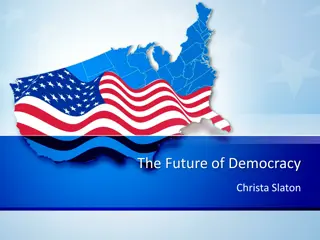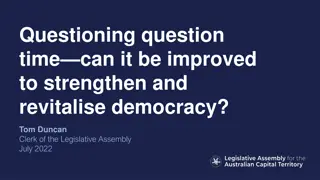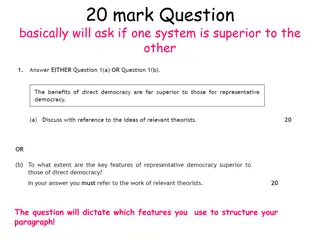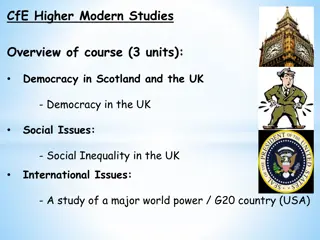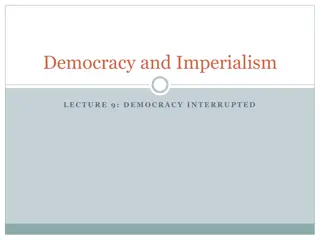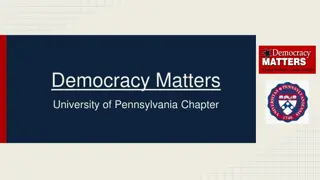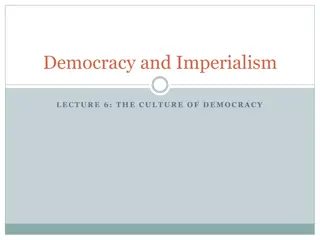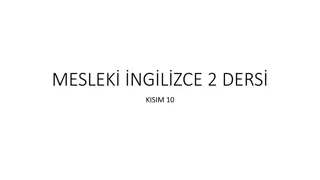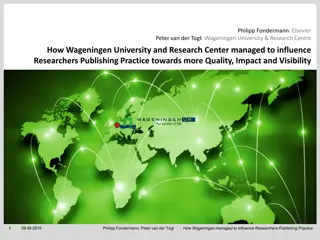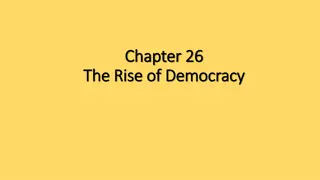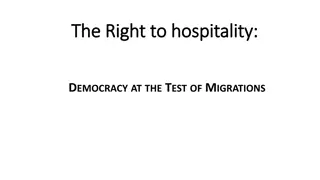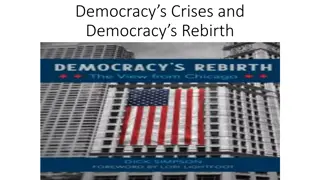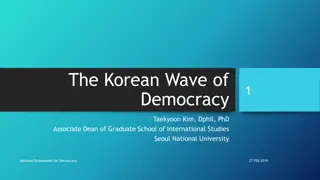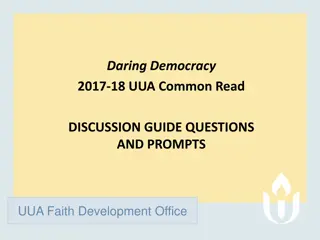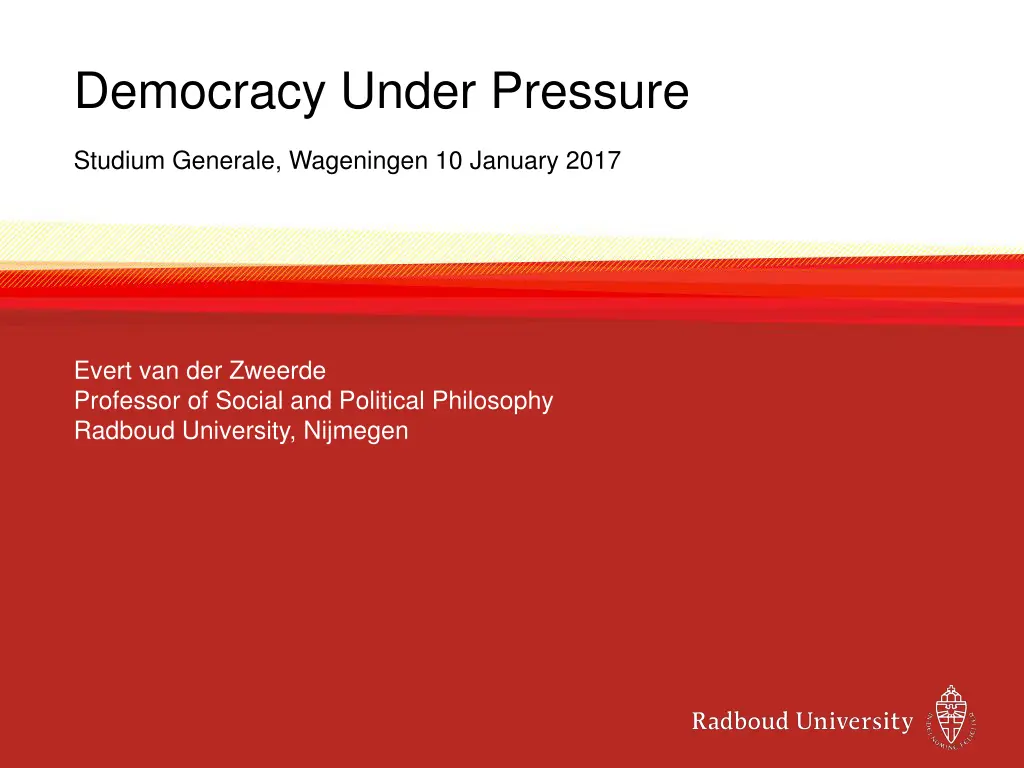
Philosophy of Politics: Understanding Democracy and Society
Explore the intricacies of political philosophy, delving into questions about democracy, justice, and societal conflicts. Discover the essence of politics and the diverse perspectives that shape our understanding of governance and societal structure.
Download Presentation

Please find below an Image/Link to download the presentation.
The content on the website is provided AS IS for your information and personal use only. It may not be sold, licensed, or shared on other websites without obtaining consent from the author. If you encounter any issues during the download, it is possible that the publisher has removed the file from their server.
You are allowed to download the files provided on this website for personal or commercial use, subject to the condition that they are used lawfully. All files are the property of their respective owners.
The content on the website is provided AS IS for your information and personal use only. It may not be sold, licensed, or shared on other websites without obtaining consent from the author.
E N D
Presentation Transcript
Democracy Under Pressure Studium Generale, Wageningen 10 January 2017 Evert van der Zweerde Professor of Social and Political Philosophy Radboud University, Nijmegen
Outline: 4 parts 1. Deconstructive Part Getting Rid of Some Received Views [post-it s] 2. Reconstructive Part Democratic Theory for a Glocal Era [post-it s] - Break 3. Interactive Part [based on your questions] 4. Q&A
Preliminary Remarks Political Philosophy . What it is not: Political Philosophy Political Science [ Politology ] Political Philosophy Political Theory Political Philosophy History of Political Ideas Political Philosophy Politics
Preliminary Remarks [cntd.] Political Philosophy: What it is: a. Philosophical Reflection on General Political Questions (including political science, political theory, history of political ideas, and politics), e.g.: What makes political science / theory scientific? Why do political ideas have a history? What is the best form of government? What is justice / a just society? What is democracy? Is it good / right ? Many questions, many answers
Preliminary Remarks [ctnd.] Political Philosophy: What it is: b. Philosophical Reflection on Ontological Questions, e.g.: Why is there politics ? Is a post-political / a-political society possible? Is (wo)man a political animal [Aristotle]? Again many questions => one of them: Why is there such a thing as politics and not simply not? [Cf. Science, Art ] Answer: There is politics because there is the political , i.e. the dimension of possible [not: actual] conflict in everything societal. Anything can become a politicum, i.e. something that people disagree about, sometimes profoundly, sometimes up to the point where they are ready to die for what they see as a noble or sacred cause, or simply as their legitimate interest. What in some contexts is an innocent piece of clothing can become, in another place or at another time, something that divides a society to the bone. Example 1: burkini in France. Example 2: the definition of parts of Palestine as Jewish homeland. Example 3: calling some people deplorables .
Preliminary Remarks [ctnd] Politics can be understood as a name for all ways of dealing with the political . This includes: oppression, homogenization of a population (e.g. by banning or killing a majority), and denial, it further includes uprisings and revolutions, occupation of government buildings and political murder, but it also includes party pluralism, good governance and the neutralization / depoliticization of particular domains or fields of activity, e.g. religion, economy, or science [academic freedom]. NB: to be precise, war and civil war are not themselves forms of politics, but to go to war, to declare war, or to threaten with war, are forms of politics. If anything can be political => (a) that politics itself (as a domain ) is, by definition, political: we can e.g. (profoundly) disagree about proper forms, and (b) philosophy (and science) also have a political dimension. Hence: c. Political Philosophy is also the Articulation of the Political Within Philosophy, and, more broadly: academia. So: what I am doing tonight is also, and inevitably so, political. In the past, philosophers, like politicians, have been persecuted and killed because of their ideas.
Outline: 4 parts 1. Deconstructive Part Getting Rid of Some Received Views [post-it s] 2. Reconstructive Part Democratic Theory for a Glocal Era [post-it s] - Break 3. Interactive Part [based on your questions] 4. Q&A
1. Deconstructive Part A. Why do we have received views about, in this case, democracy / democratic politics? - i. We, humans, are all born into a polity, a society that has a particular political form (ranging from a single party dictatorship in North Korea to a crowdsourced constitutional republic in Iceland). - ii. The depoliticization of economy, religion, or academia may be a good idea, but it is not obvious. - iii. We, humans, live in our politically shaped society as a second nature westerners live in liberal democratic polities like fish live in water, it feels like a natural and obvious socio-political environment => we live and think in our habitual box. - iv. Academic political theory is heavily dominated by scholars from the West (including its global branches, e.g. in Gulf states). - v. Democracy is normatively dominant / hegemonic since World War II [1948 UN UDHR, art. 21].
UDHR 1948 Article 21. (1) Everyone has the right to take part in the government of his country, directly or through freely chosen representatives. (2) Everyone has the right of equal access to public service in his country. (3) The will of the people shall be the basis of the authority of government; this will shall be expressed in periodic and genuine elections which shall be by universal and equal suffrage and shall be held by secret vote or by equivalent free voting procedures.
1. Deconstructive Part B. Democracy Liberal Democracy: - i. A widespread view: democracy = liberal democracy => when people say democracy they mean liberal democracy, e.g. freedom of speech. - ii. Liberal democracy as it exists is an historically contingent combination of liberal and democratic principles [Ch. Mouffe, N. Bobbio]: a. Liberal principles: human rights, individual (& minority & group) rights & liberties, rule of law; b. Democratic principles: equality, identity ruler / ruled, popular / d mic sovereignty. - iii. Even if the contingent compound liberal democracy is a strong one, it is subject to liberal pulls and democratic pushes. Example: US system of judicial review [J. Habermas] Example 2: populism as a democratic impulse. - iv. Because of the contingent nature of the combination, other possibilities are: a. Liberal non-democracy: equal rights and liberties for an elite. b. Illiberal democracy: mass legitimization of an authoritarian regime. c. Illiberal non-democracy: totalitarian regimes.
1. Deconstructive Part C. Democracy Elections : - i. Elections are important for democracy, arguably indispensable, but that does not mean that democracy can be reduced to it. - ii. Academic political science and public media focus on elections. - iii. The key notion is that of FFFUCS: Free, Fair, Frequent, Universal, Competitive, and Secret elections. - iv. If we assume that not all can rule, and that we must select , we should not ignore another major form of selection, viz. sortition [or: lot], common practice in democratic Ancient Athens and known to us from the judicial system in several countries (juries). - v. Any form of selection lead to some engaging in government, but most not engaging in it: this reduces citizens commitment. - vi. Without participation / discussion / deliberation, democratic procedures may still work, but they will tend to focus on winning the debate rather than on bringing forward the best arguments => democracy ends as a national popularity contest or a reality freak show!
1. Deconstructive Part D. Democracy a particular type of regime or government. - i. We are used to saying that, e.g., the Netherlands or the UK or the RSA are democracies this is, in fact, shorthand for polities that include many democratic elements . - ii. Many situation in society s life can be more democratic or less democratic : this ranges from a family deciding where to go on the next summer holiday, via a university department or a laboratory, to a country or the UN. - iii. It is never a priori decided whether, or to which extent, a particular situation is organized democratically => this is always open for debate and open to change! - iv. Democracy is not an entity [a thing ], but a quality of entities.
1. Deconstructive Part E. Crisis? What crisis? - i. Crisis is intrinsic to democracy. Crisis [<= krinein / = to decide, to dinstinguish => critique / criticism] = decisive moment / period / phase. Cf. pneumonia before the invention of antibiotics. General elections: for a brief moment, government is suspended , and often the old government is discarded. Election campaigns: politicians criticize each other, and citizens have to critically make up their minds. - ii. Crisis belongs to the core of democracy: elections themselves are a moment of crisis: the adult population with political rights -d mos- is divided into parties [<= part, pars], and radically into individual, lonely voters; out of the crisis comes a will of the voter .
1. Deconstructive Part [ctnd.] E. Crisis? What crisis? - iii. However, the current crisis of democracy is not the habitual one: a. All [almost all] regimes claim to be democratic, i.e. to be based on the will of the people [UDHR 1948; waves of democratization], often even in their names: DPRK, R p. D m. du Congo: => inflation ; b. The near-exclusive focus on national politics (as opposed to local and transnational) and, consequently, (perceived) national interests, does not do justice to a number of very serious global / transnational problems: migration, ecology, climate change, socio-economic inequality; c. The reduction, by and large, of democratic politics to general elections leads to a largely passive, consumerist citizenry: in political science, we see a predominance of FFFUCS [Free, Fair, Frequent, Universal, Competitive, and Secret elections]; d. Given this situation, the introduction of referendums reinforces, rather than compensates, citizen passivity => negative politics & impossible tasks.
To sum up: A. Try to think out of our habitual, liberal-democratic box. B. Liberal democracy is a contingent compound of liberal and democratic principles. C. Democracy FFFUCS & cannot be reduced to it: FFFUCS alone SUCKS! D. Democracy is not a thing, but a quality of things. E. Crisis belongs to democracy, but the current crisis is special.
Outline: 4 parts 1. Deconstructive Part Getting Rid of Some Received Views [post-it s] 2. Reconstructive Part Democratic Theory for a Glocal Era [post-it s] - Break 3. Interactive Part [based on your questions] 4. Q&A
2. Reconstructive Part A. Democratic Politics - i. If Democracy is a quality of political situation & If Politics = dealing with the political (the conflict potential of difference) => Democratic Politics is that form of dealing with the political that has the quality democratic . - ii. This quality democracy is present if (or: to the extent to which) all those (or: the vast majority of those) who are significantly affected by or concerned about particular policies (not only decisions, but also legislation and its implementation, i.e. governance) are entitled (from nominally to effectively), on a[n] (relatively) equal footing, to have a substantial say (ranging from voice via vote to veto) in the decisions that shape those policies. - I.e.: Quality democracy is present if all concerned by particular policies are equally entitled to a say in the decisions that shape those policies. - iii. This quality is a possible quality => its presence / absence is itself a matter of decisions and policies => democracy feeds back on itself.
2. Reconstructive Part B. Form, stage, sense i. Modern democratic politics is the attempt to give maximum space to the political => to make difference and conflict potential part of political situation, include, not exclude it. ii. The transition from a pre-political (where the political is wild ) to a political situation is a matter of mise en forme, mise en sc ne, mise en sens [C. Lefort; mise <= mettre] => giving shape/form, creating a stage [ public ] and making sense = giving meaning / direction. - a. giving shape: inventing & regauging appropriate forms, e.g. procedures; - b. creating a stage: arena, publics, e.g. free press [neg. ex. FOX vs. CNN]; - c. giving meaning / direction: intellectual debate, academic study, etc. iii. This applies not only to the nation-state but equally to subnational and supranational situations: it can be done in any place.
2. Reconstructive Part Elections and referendums. - i. An element of the form of a democratic polity can be elections. - ii. FFFUCS are a form [not argument against elections in general!]: a. Free elections are better than Unfree ones; b. Fair elections are better than Rigged ones; c. Frequent (repeated, regular) elections are better than irregular ones or one man one vote one time elections [F. Zakaria]; d. Universal elections are (usually) better than selective ones; e. Competitive elections are better than ones in which there is no battle for victory ; f. Secret elections can be better than overt ones (e.g. raising hands). - iii. Referendums are also a form [not an argument against referendums in general!]: a. There are many types of referendum: advisory vs. binding, legislative vs. veto, citizens vs. government initiative, etc.; b. Like elections, referendums are not a bonum in se [good in itself]: their value depends on the overall situation they are part of; c. The precise question / topic of a referendum is often more important than the outcome. - iv. Both elections and referendums can be vital parts of democratic politics, but the reduction of democracy to their combination is lethal.
2. Reconstructive Part C. Political subjectivity / agency. - i. In each & every case, democracy has to do with the life of a political community (which can be a nation, but also a university or a global humankind). - ii. There is no other political subject / agent than we [B. de Spinoza: ultimately, every polity is democratic ]; - iii. It necessarily, hence always and everywhere is a matter of we a we , any we - to make its situation more democratic or less democratic => (de-/re-)democratization is an ongoing process that is up to us an us , any us - and that is likely to find an opposing they ; - iv. Democracy is always-also about struggle: struggle for democracy, struggle against violence, struggle against division, etc.
2. Reconstructive Part D. Democracy, as a possible quality of any political situation can be present at each of 5 steps of the political proces: Deliberation Decision-taking Agenda-setting Reflection / Preparation Implementation
2. Reconstructive Part E. Scale and size. - i. Representative democracy was not invented in order to deal with the size or complexity of society, but in order to improve the quality of those who rule: elective aristocracy and as a barrier against majority tyranny . - ii. The big challenge is to make democracy a reality for all concerned without falling back into majority tyranny . - iii. Contemporary society and its problems are immensely diverse and complex. - iv. Democracy must obtain a plurality of forms beyond (i) the national level and beyond (ii) the exclusive focus on FFFUCS. - v. HOW this is to be done is not an academic question => every we has to reshape its political reality.
2. Reconstructive Part F. Positively. - i. What needs to be (re)inforced, at the expense of the national level, is democracy at local levels [sub-national] and democracy at regional and global levels [supra-national]. Academics can provide ideas, but demoi have to do the job. - ii. It makes sense to introduce sortition as an additional selection instrument next to election. - iii. Larger (much ) parts of populations must have advisory and deliberative capacities and competences => citizens juries, G1000. - iv. Representative democracy must be combined with direct forms of democracy, including ones that only now become technically possible [e democracy]. - v. People s tribunates can be established at all levels, even at the global level [United Nations with a people s chamber ].
To sum up A. Quality democracy is present if all concerned by particular policies are equally entitled to a say in the decisions that shape those policies B. Giving shape/form, creating a stage [ public ] and making sense = giving meaning / direction can be done in any place. C. There is no other political subject / agent than we . D. At least agenda-setting, deliberation, and decision-taking can be made (much) more democratic than they currently are. E. Democracy must obtain a plurality of forms beyond (i) the national level and beyond (ii) the exclusive focus on FFFUCS F. There are many possibilities to make the world more democratic, and address major problems democratically it s a matter of political will.
Outline: 4 parts 1. Deconstructive Part Getting Rid of Some Received Views [post-it s] 2. Reconstructive Part Democratic Theory for a Glocal Era [post-it s] - Break 3. Interactive Part [based on your questions] 4. Q&A
BREAK NB: please hand over your post-it s!
Outline: 4 parts 1. Deconstructive Part Getting Rid of Some Received Views [post-it s] 2. Reconstructive Part Democratic Theory for a Glocal Era [post-it s] - Break 3. Interactive Part [based on your questions] 4. Q&A
3. Interactive Part Trying to deal with a plurality of different, sometimes very different, qeustions, objections, and opinions
Outline: 4 parts 1. Deconstructive Part Getting Rid of Some Received Views [post-it s] 2. Reconstructive Part Democratic Theory for a Glocal Era [post-it s] - Break 3. Interactive Part [based on your questions] 4. Q&A / Discussion
4. Questions, Answers, Discussion Point for discussion 1: The division of the world into peoples that inhabit countries is a major obstacle for global solidarity and for the solution of many of the problems that we, as humankind, face today. Therefore, we should do away, in the long run, with this division.
4. Questions, Answers, Discussion Point for discussion 2: If we want to give all concerned a say and if it is practically impossible to let all participate in government, then we should, at the very least, have a people s tribunate with advisory and veto power at all levels, from primary school to the United Nations.
4. Questions, Answers, Discussion Point for discussion 3: If we think that governance is best done by experts, we still need democratic legitimation of that type of expertocracy => the experts have to convince populations that they are the best equipped to govern.
4. Questions, Answers, Discussion Point for discussion 4: The people is / are never wrong, but it is (/they are) easily misled.
Outline: 4 parts 1. Deconstructive Part Getting Rid of Some Received Views [post-it s] 2. Reconstructive Part Democratic Theory for a Glocal Era [post-it s] - Break 3. Interactive Part [based on your questions] 4. Q&A / Discussion THANK YOU for your attention & participation!

